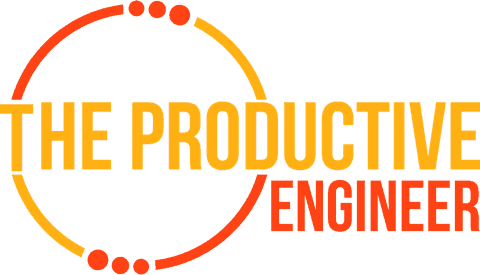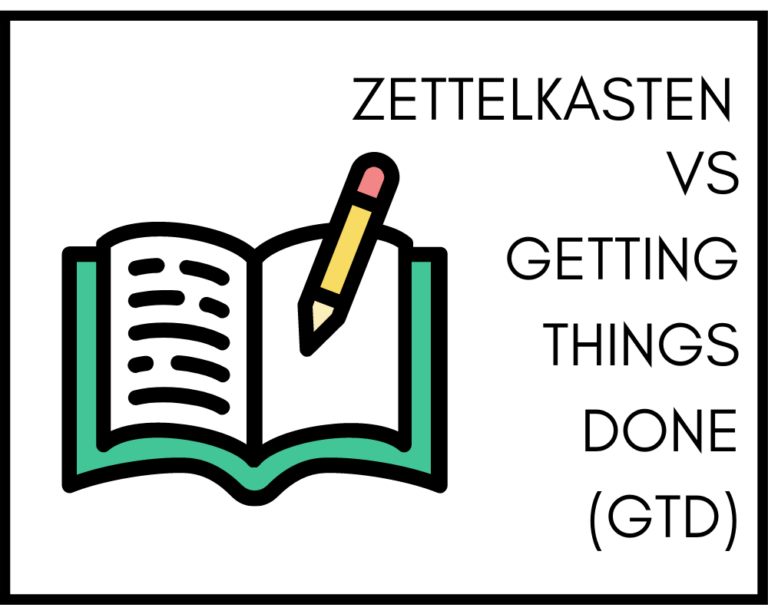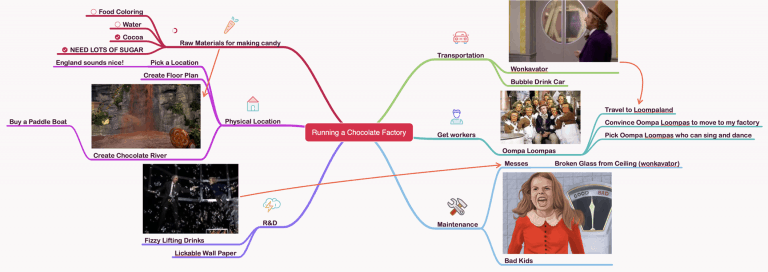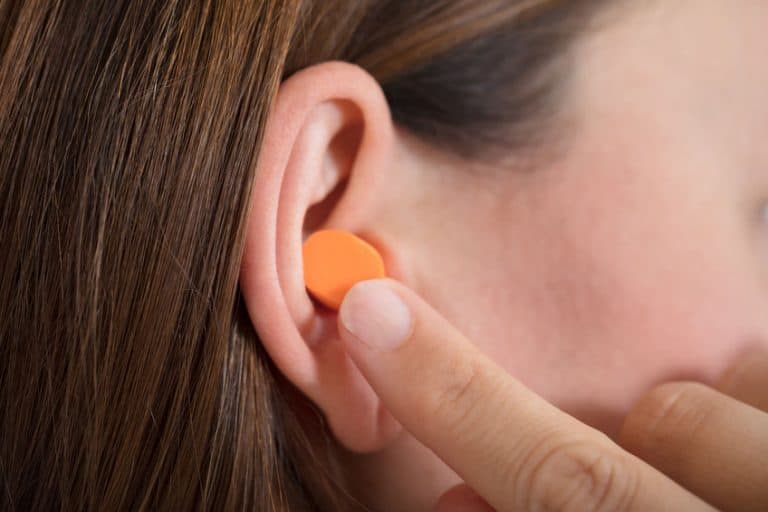Does Studying While Tired Work At All?
We’ve all been there. The dreaded night when you’re physically and mentally exhausted, but you have to study for a big test or critical meeting tomorrow and can’t consume enough coffee to focus at all. We’ve all had to shove information in our brains at a rushed last minute, but the real question is – Are we retaining any of that information in our exhaustion or would it be better just to get more sleep?
Does studying while tired work at all? The answer is yes, and no. Obviously, a late-night cramming session will is better than not studying at all, but a UCLA study proved that students performed worse on their exams if depriving themselves of sleep when they analyzed the association between time studied the night beforehand and subsequent performance.
This article will be your guide to how studying while being tired can affect your body if it’s better to get more sleep or study more, as well as brilliant tips to improve your study quality if you do have to cram while exhausted! This information applies to everyone because it’s not just for students cramming for a high school exam, or medical interns prepping for a critical medical school test, it can apply to all adults in their professional lives preparing for a significant opportunity, meeting, or presentation.
While we are on the topic of studying, are you looking for some tips on improving your studying? Check out our article on the twenty-five most important study tips that will improve academic performance at the link below:
25 Study Tips to Improve Academic Performance
Before we get started, if you are looking to improve your writing, you should really check out Grammarly. Grammarly is a godsend for those who have to write term papers, dissertations, or anything else you write that needs to be grammatically correct. Grammarly doesn’t just check grammar either. It helps you to write clearly and effectively by checking for overused words and unclear phrases. Best of all, Grammarly has a great free tier to get started with. For more information on Grammarly, click the link below:
Grammarly – Great Writing, Simplified
If you are looking for the best study tools out there, you should read our article on the best study tools to enhance your studying at the link below:
The Ultimate Study Tools You Must Use to Succeed!
Does Studying While Tired Work at All?

College and high school students are often balancing a variety of different priorities, including school, tests, jobs, hobbies, sports, and social obligations. It seems like anytime you have to prep for something unexpected, it’s because life took over in its usual mayhem and left you with less time than you thought you’d have to prepare.
Procrastination is another reason we also find ourselves with less time than we expected to study for an exam, but regardless, it’s time to kick it into gear!
The study I mentioned was done in 2012 by UCLA on over 500 students in the California area. They took a close look at the amount of time the students would cram before an exam and studied how much trouble they had the next day in class.
What they found was that cramming often does not result in better grades before an exam, and often the student will do even worse from not getting sufficient rest.
This finding is good and bad news because it means that cramming won’t result in a better grade. From my personal experience, I’ve crammed before a relatively simple presentation or test and done much better than I would have done without skimming the information at all.
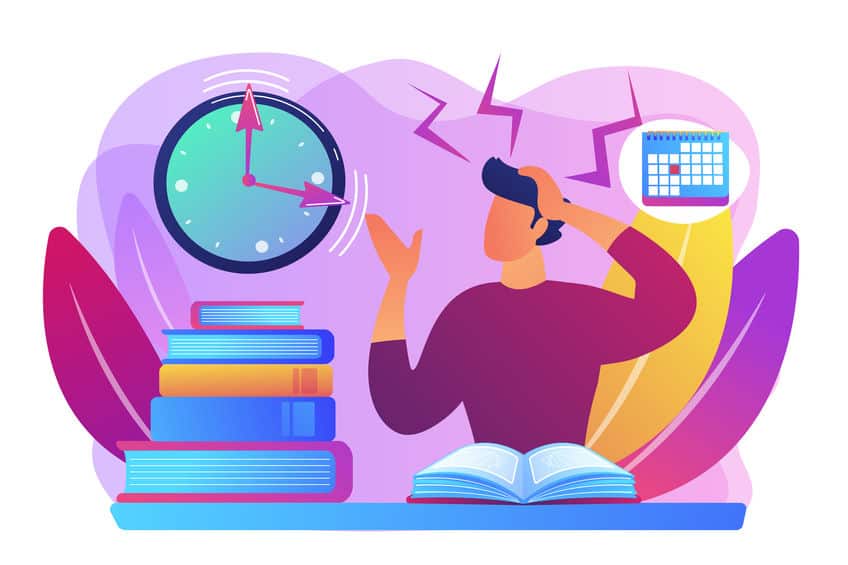
Scientifically, cramming is not the recommended direction to go. It’s somewhat sad news because you’re only cramming in the first place to do the best job possible, and yet you have the exact opposite effect on yourself and make it much worse.
At least you know this sooner rather than later so you can prevent the problem. We will discuss the science behind it and in the emergency event of a session which demands cramming – the tips that will get you through it with the most success!
Looking to improve your note-taking? Check out our Guide to Using the Zettelkasten System. Zettelkasten is a great note-taking system for organizing your idea
Sleep Deprivation’s Effects on Your Brain
If you want to understand the cost/benefit of your eleventh-hour attempt to fill your brain with relevant information, try not to do it at the expense of your sleep.
Some may argue, ‘that is impossible, I have a last-minute deadline, and there is no time for sleep right now. I’m pulling an all-nighter!’ This position sounds brave in theory, but in fact, could lead to worse effects the next day when it counts.
Sometimes there aren’t enough hours in the day which we all struggle with, but if you’re burning the candle at both ends, then you need to know what that’s doing to your body.

Some of the most common effects of not getting enough sleep are:
- Losing a train of thought and not being able to focus the next day.
- If you are repeatedly yawning. Research shows that missing as little as 2 hours of sleep can have a drastic impact on your body’s reaction speed.
- You are experiencing a loss of long-term and short-term memories or an inability to recollect them.
- You are feeling spacy and lethargic like you’re dragging yourself around.
- Experiencing a struggle to learn and retain new information.
- Increased emotional stress, feeling more irritable than usual.
Potential Outcomes of Extended Lack of Sleep

- It causes more accidents – The National Highway Traffic Safety Administration estimates that in the US, fatigue causes 100,000 auto crashes and 1,550 crash-related deaths a year. The problem is most significant among those under 25 years old. You could not only fail your exam but also injure yourself or someone else. Don’t put yourself or others in danger and think of the bigger picture. Long term consequences are real, and no one will be responsible but you.
- Degradation of health if continued for a long duration of time, can lead to heart diseases, higher blood pressure, fainting episodes, lack of nutrients absorption, mood swings, increased risk of stroke, and over the long-term, increased risk for Alzheimer’s.
Missed Opportunity for Memory Consolidation
Interestingly enough, your brain is very active while you’re sleeping. The name for this is memory consolidation, and it basically can be summed up as your mind working through a problem while you’re unconscious. Multiple studies are proving that your performance will worsen when compared to just getting more rest.
Although it is at rest, your mind can still be working through the problem at hand and working out kinks that it wouldn’t even do if you were conscious! The brain is endlessly fascinating in its capability. This ability the brain possesses is why people often find the answer to their dilemmas in their dreams and pop out of bed, knowing just what to do!
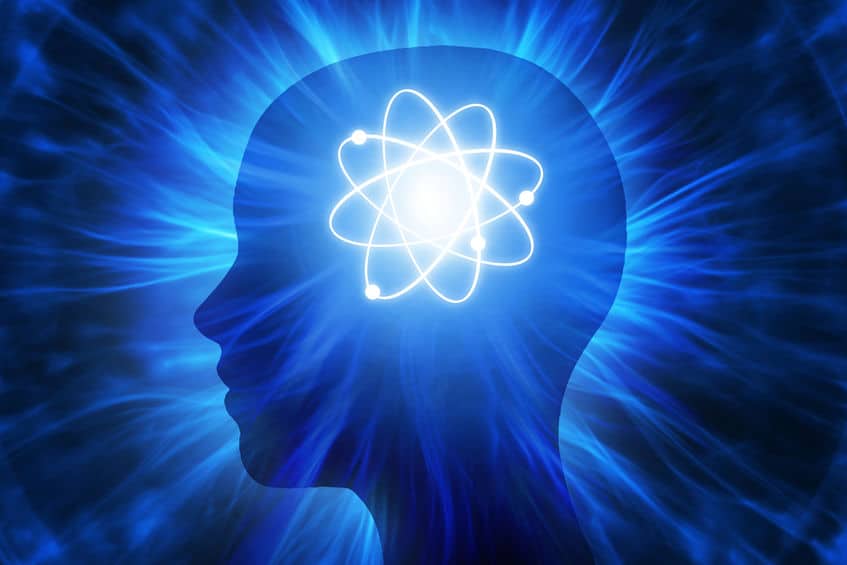
The brain’s ability to process effectively while at rest is also why people listen to recording tapes of hypnotism to quit smoking, learn a new language, beat their anxiety, and more, all while they’re fast asleep! There are real substantive data that our brains have quite a lot of skill while we’re knocked out on the pillow.
Since you’re still learning when you’re catching those Z’s, (way to go human subconscious!) this means you should opt for rest above pulling that all-nighter.
Make the most of this time and leave a recording playing softly in the background of the information you need to retain by morning. Passive listening could have a much better effect on your performance the next day than sacrificing your rest to cram.
How Much Sleep Do You Really Need?
To be at your best, you need to get a certain amount of sleep. How much sleep you need will depend on your age, weight, and genetic predisposition. Some people can function having slept 3-4 hours while others, like me, need double that number (which is ridiculous and not fair).
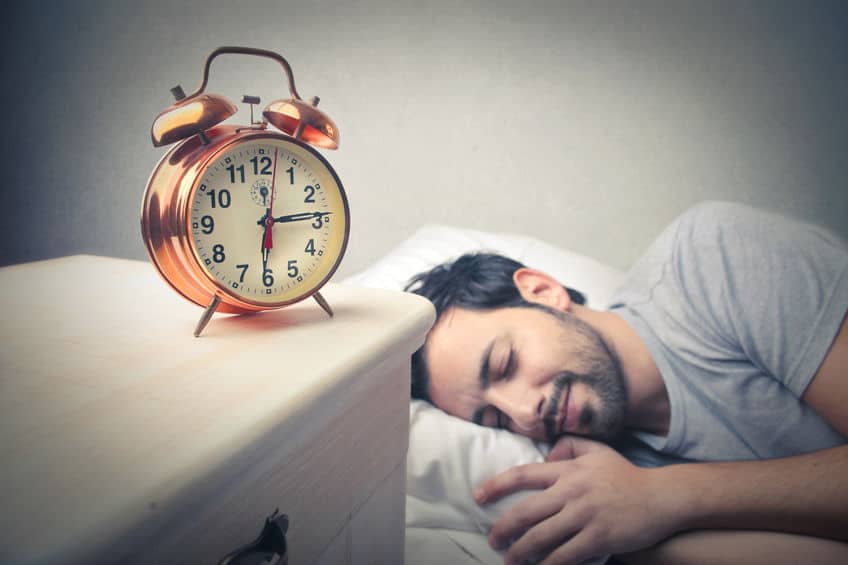
The reality is that most of us need between 6-9 hours of sleep, with the agreed-upon average being at least 7 hours to function at full brain capacity.
The breakdown, by age, of how much sleep you need is:
- Newborns (under three months of age) – 14-17 hours
- Toddlers (1-2 years old) – 11-14 hours
- Preschoolers (between 3-5 years old) – 10-13 hours
- Young School Age (around 6-13 years old) – 9-11 hours
- Teenagers (between 14-17 years old) – 8-10 hours
- Young Adults (18-25) – 7-9 hours of sleep
- Adults – Same
- Seniors – Same (or possibly 1 hour more).
You can notice that as we age, we require less and less sleep, evening out as a young adult for about the next 40 years. The essential period that our bodies need the most rest is when we are young.

Needing more rest when you are young is because the body is working overtime to grow us and make us taller, bigger, and stronger. This growth and maturity is a huge undertaking that utilizes all your resources and requires more time to boost your battery power.
As an adult, our bodies have matured to our full height and size; therefore, less energy is required to sustain the body. Proper growth is dependent on rest. So if you’re under the age of 25, you really shouldn’t be sacrificing on sleep.
This reality is ironic because teenagers are the ones who can go nights without rest and seem to have so much more energy than older adults. But the fact is, they’re the ones who need it the most and will pay a substantial cost for not getting enough sleep.
To Cram or Not to Cram? That is the Question!
When you force a last-minute study session into your mind, this will result in sleep deprivation which will lower your ability to focus the next day in class or at your job.
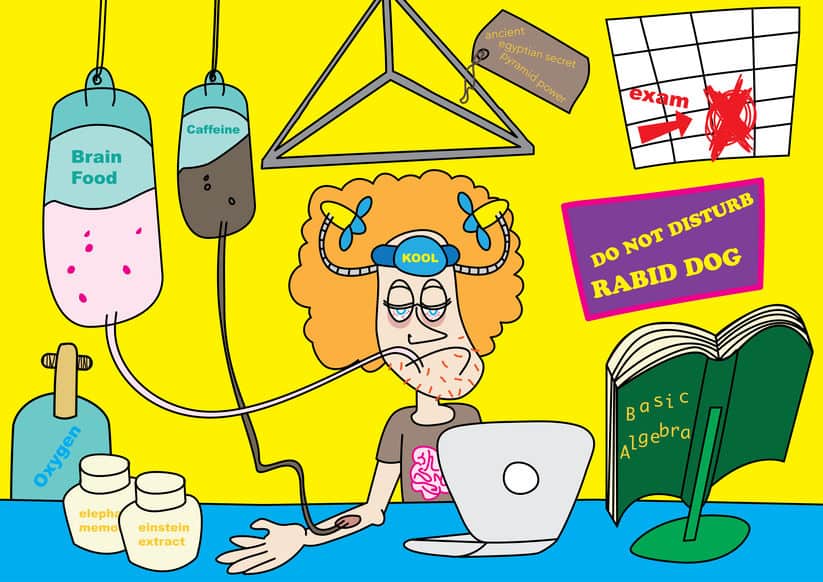
To answer the question of whether cramming works is challenging because, in my opinion, it’s better than nothing. At least if you read it once then, hopefully, some of that information will miraculously appear while you are testing. So yes, it certainly must work a little.
But I’ve always been one to err on the side of sleep is more valuable to my success the next day than a cram session. You’ll need to filter these tips through your own experience and what you know about yourself. Perhaps you’re the kind of student or employee that is wonderful at cramming and can function on 3-4 hours of sleep because of it.
Most of us, however, require 7-9 hours of sleep and will not function as well without it.
Usually, cramming consists of staying up all night and studying. Research shows that you are less likely to retain the information than if you studied in chunks of times with long breaks or even days in between.
For me, I know the best studying technique is to read it over a couple of times with low pressure. Not cramming but just ingesting the information through my eyes like a piece of apple pie. I go to sleep and get a full night’s rest. Then read it over one more time before the event itself.
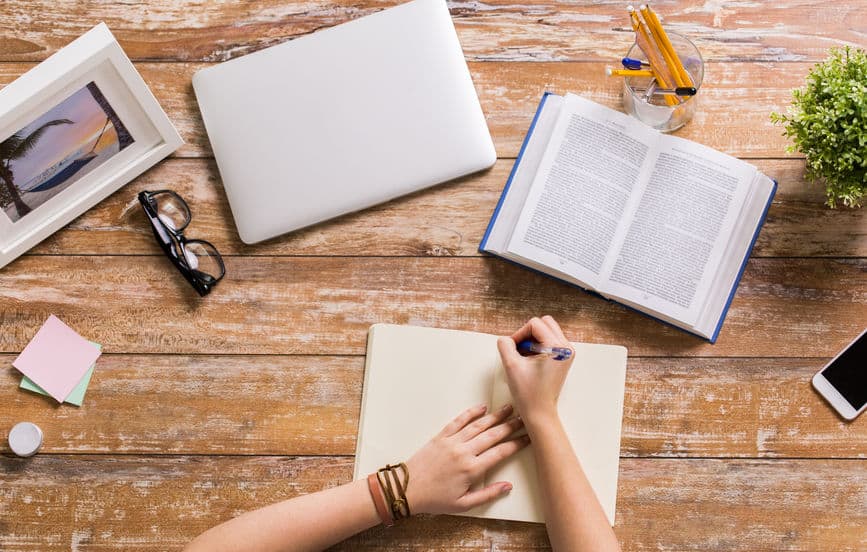
At this point, I’ve read the information 3-5 times and gained what I can from it. If you want to feel more prepared, start studying days or even weeks beforehand. Studying consistently over time is the only consistent pathway to success.
Feeling prepared isn’t just a matter of knowing the material inside and out, but also the confidence that goes along with having familiarized yourself with the data for months instead of only 24 hours before the exam.
Ultimately, cramming is an inefficient way of doing things. It’s not only bad for your grades but could result in decreased health if continued for extended periods.
Effects of Cramming information the night before an important event include:
- Proven to have a lower performance the next day based on lack of sleep
- Lowered retention of the data versus weeks of repetition and preparation
- Inability to recall things that you recently read in the last 24 hours because you’ve overloaded your brain’s capacity without the necessary rest to recollect off the top of your head.
- Increase in test anxiety. Very common in students or employees when giving a presentation without sleep.
- You are plying yourself with medications such as caffeine, energy drinks, or other substances that raise your heart rate and can lead to health issues over time.
The list goes on but what I’m trying to get at here is this:
Don’t cram for an important event.
If this is your exam to get into medical school, you should have been studying months ago. If this is the presentation to land a big promotion at work, you have the job, or you don’t. Let’s not risk putting our bodies in harm to pull all-nighters for things we’re already going to make worse by not sleeping.
Since I’ve scared you off from cramming – and I think you get the picture, I’m now going to give you tips on cramming successfully. I know this is a big 180 switch up that I’m pulling on you, but there are times when cramming is necessary.
Since you’re going to do it anyway – I’m going to help you do it well!
How to Cram! Tips for Success
Sometimes, even though we don’t want to – we’ve got to cram. Studying when you’re exhausted is difficult but not impossible.
Being productive when you don’t have a lot of time can cause some people to push harder and do better. This attribute is very personal, and you need to filter everything through your experience and circumstances.
I need more sleep than study time, but someone else may need every bit of knowledge they can stuff into their noggin and be able to power through until after the exam and then take a big nap! Do what works for you.
Here are my brilliant tips for keeping you awake and helping you power through your study sesh:

- Stay Hydrated – This one is essential because when the brain is thirsty, its blood vessels will shrink, causing you to be unable to think as clearly or efficiently. If your entire body is adequately hydrated, the brain will be thinking sharper. Sleep and water are the two main things we require as homo sapiens. We can survive a couple of weeks without food, but only a matter of 8-10 days without sleep before going crazy and only 1-3 days without water.
- Mint Gum – Mint is a fragrance and taste that is proven to strengthen our sense of awareness and ability to retain information. These attributes of mint also extend to mint-flavored essential oils so even having a mint candle around or the oils while you study could be helpful on a deeper level.
An exciting part of this equation is that the brain, fascinatingly, will respond even better to this technique if you chew the same gum or smell the same fragrance while taking the exam. Something about the cognitive relation that memorized information has connected to the sense of smell will help the data resurface more lucidly. Amazing, right?

- Take a Power Nap – a little sleep is better than no rest at all. Taking naps used to be one of my techniques when I was in school. I would soak up as much of the information as I could before I started to feel too tired. If I can no longer retain another fact, it’s time for a nap.
- Learn from my mistakes with this one and:
- Set your alarm for 3-4 hours (which is the amount of time you can get rest without falling into the second loop of the REM cycle, which will be much more challenging to awake from).
- An important tip is to set 2-3 alarms on your phone, about 10-15 minutes apart if you need a gradual snooze to wake up.
- A critical extra tip is to check that you have the volume on your phone turned up, so you hear it and wake up! I don’t know how many alarms I’ve set and then forgotten to take the phone off vibrate, so I missed that appointment.
- Set your alarm for 3-4 hours (which is the amount of time you can get rest without falling into the second loop of the REM cycle, which will be much more challenging to awake from).
- Which leads me to a final bonus tip on this power-napping-business – Set a backup clock. Yes, another alarm that is separate from your cell phone in case the battery dies, or you don’t hear it. If you are looking for a good alarm clock that doesn’t feel like it’s from the 80’s, check out the Amazon Echo Show. It has a 5.5 inch display and all the power of Alexa. It supports multiple clock faces and is just a really slick device. To learn more about the Echo Show, click the link below:
link to Echo Show
Take these precautions, and you should wake up in time to have a few more hours to study feeling a bit more rested than before your nap.

- Study with a Group – this is a great way to keep yourself entertained and awake! There is power in numbers, and someone may understand the subject matter better than you and raise everyone’s average.
The only tip here is not to get distracted by too much socializing and study even less than you would have alone. If you know yourself to be a chatty Kathy that can’t wait to spill the tea, then ditch this tip.

- Eat a Healthy Snack – keeping yourself fueled will help you stay focused for longer. This one is simple, opt for the banana and cold brew instead of the energy drink that will make you crash and Cheetos that will spike your sugar or sodium, also will cause you to crash!
- Take hourly Breaks – If you’re going to be up all night, you will last much longer if you take breaks at least every hour. Taking breaks may sound like a lot of stops and go, but your body will thank you for the mental pauses.
Even a few moments of walking up and down the hall or a couple of minutes of other exercises can get your blood circulating and power up that metabolism, so you don’t feel quite so jet-lagged in your time zone. Take that time to stretch your body and move around. Loosening up your joints will help you sit awake for a longer duration and increase your overall stamina.
Just make sure that you do not lie down. You most likely will fall asleep, so don’t even risk it unless you have set the primary and backup alarms.
- Be intentional – If you’re intentional about your study session, then you can plan the things that absolutely must be done while you’re still fully awake and have sufficient brain power. Save the more straightforward stuff for last and start with the difficult.
If you’re stumped on a topic, move on. Don’t get hung up on tricky problems that may not be that important. Try to get a feel over the entirety of the information and that way you’ll be more confident going into the situation.

In the case of an important work meeting, you want to be prepared but also don’t want to come off scripted. This is where you need to find a balance of being natural and not ‘over-preparing.’
In the case of an exam, you probably ought to be fully prepared on the information, and there’s usually not such a thing as, ‘over-preparing.’
Cram in the best way possible and then let it be. Get enough rest to function at a higher capacity, and you should be golden! These are my words of wisdom. Filter them to your situation and your self-awareness of how much rest you require. Somewhere in that balance, you will find what works best for you!
Precisely Why Sleep Beats Studying
If you’re still not convinced that the extra hour of sleep will do you more good than the extra hour of studying, do your own research. The facts are very straight forward that as humans, we are fragile and require a lot of sleep. To put it simply, if you’re not sleeping then you’re not at your best.
You could think that you’re one of the vibrant and lucky few that can function on less than five hours of sleep a night. Try that out for a while and let me know how it goes! Only about 2% of the population will perform well without the recommended sleep duration.
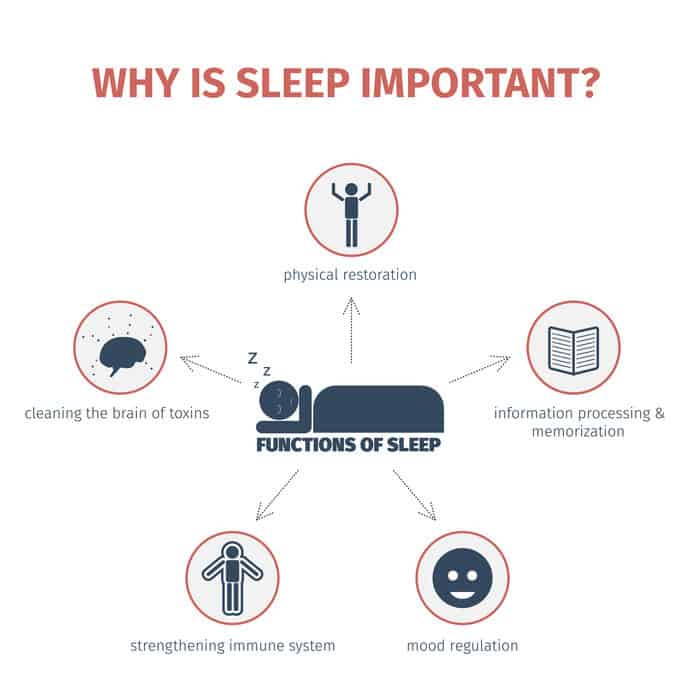
So science says that you’re one of the 98% that need 7-9 hours. Logic and majority point to this, but feel free to experiment with different amounts of sleep to see where you function best. This can vary based on region, climate, lifestyle, occupation, fitness and health levels, age, as well as genetic predisposition.
Sleep experts say that only about three to five people in a group of one hundred can get by on less than 6 hours of rest and perform well. If you’re in that 2-5% that can function with 2-6 hours of sleep, then god bless you. But science points to no for most of us.
Even if you think you’re one of these rare few, a side-effect of not getting enough sleep is to believe you are performing better than you are.
Not only are you performing worse, but you’re too tired even to be fully conscious or aware of how poorly you’re doing. If you haven’t slept in days, you truly cannot trust your self-assessment as you are likely in an impaired state mentally.
The Final Verdict:
I hope you can find a balance in the earlier sections of this article that warn against cramming and the later sections which tell you how to do it when you must.
Find a balance of studying along with sleep that works for your body and be sure to leave out the self-loathing and pressure. This will ultimately hurt your performance and add anxiety to the mix — not a great equation when you’re half asleep.
Get enough rest of the REM cycle to run and keep the brain in tip-top shape. This way, the information will marinate in your mind while you sleep, and you won’t be functioning on low engine power for the actual moment that it counts.
My personal recommendation is just to study for a few hours with friends and minty gum, get a good night’s sleep, then leave the rest to fate. What will be will be. You’re ready or not. Life will go on, I promise!
So now I ask you to close the textbook, set your five backup alarms, brush those teeth, and hit the hay!
Looking to Sell Your Phone or Tablet? Use Gazelle
If you are eyeing the latest iPhone, iPad, Samsung Note or other device and need to sell your current device, Gazelle has got you covered. Gazelle allows you to sell your devices quickly, easily while giving you a fair payment. For more information, visit the link below:
Want More Tips and Tricks? Subscribe to our Newsletter!
If you haven’t already subscribed, please subscribe to The Productive Engineer newsletter. It is filled with tips and tricks on how to get the most out of the productivity apps you use everyday. We hate spam as much as you do and promise only to send you stuff we think will help you get things done.
Check Out Our YouTube Channel!
We have a YouTube channel now and we are working hard to fill it with tips, tricks, how-tos and tutorials. Click the link below to check it out!
Check out our Resources page
Check out our resources page for the products and services we use everyday to get things done or make our lives a little easier at the link below:
Other Articles You Might Be Interested In
The Pomodoro Technique – Why the Pomodoro Technique Works
link to Pomodoro Technique blog post
Hardest or Easiest Work First? What the Research Shows
Link to Hardest or Easiest Work First? What the Research Shows
Is It Faster to Write in Cursive or Print?
Link to Is It Faster to Write in Cursive or Print?
